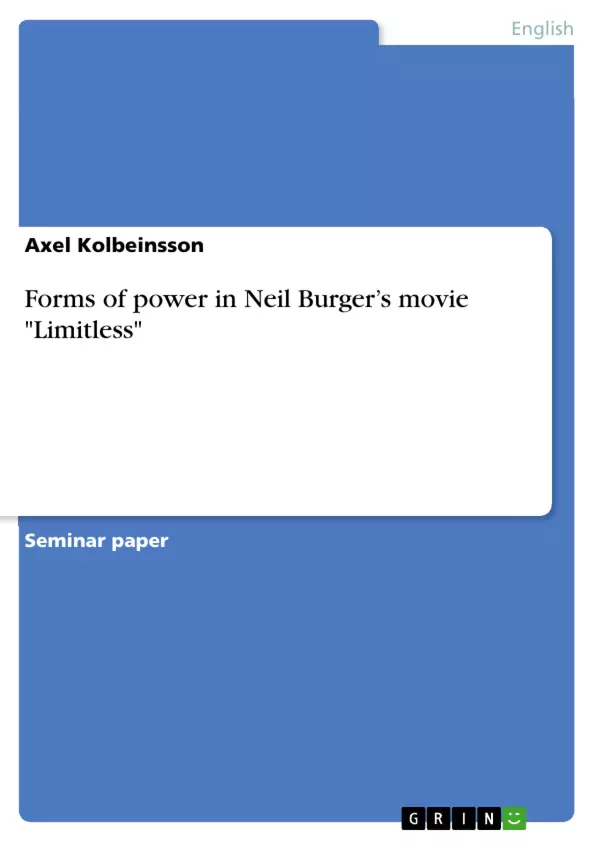Power is seen as a fundamental part of society. This term paper aims to find out, how power and power relations are depicted in a fictional society. In order to shed light into this matter, John French and Bertram Raven’s (1959) theory of five (six) `Bases of Social Power’ was applied to Neil Burger’s (2011) movie "Limitless". A number of scenes showing power relationships between characters or shifts in power through a brain enhancing substance were analyzed. All forms of power regarding the theory could be detected in various relations throughout the movie.
Table of Contents
- Forms of power in Neil Burger's movie Limitless
- Abstract
- Keywords
- Theoretical Background
- Definition
- Concept of power
- Foucault - Subject and Power
- French & Raven - The bases of social power
- Movie analysis
- Introduction to Limitless
- Analysis of main characters
- Eddie Morra
- Carl Van Loon
- Other characters
- Power relations between characters
- Legitimate Power
- Reward Power
- Coercive Power
- Expert Power
- Referent Power
- Shift in power
- Conclusion
- References
Objectives and Key Themes
The term paper explores the representation of power and power relations in a fictional society, utilizing Neil Burger's 2011 movie Limitless as a case study. It aims to analyze how power is depicted in a fictional setting by applying John French and Bertram Raven's theory of five (six) 'Bases of Social Power' (1959) to the movie's portrayal of power dynamics.
- The nature and types of power in a fictional context.
- The interplay of different forms of power within power relationships.
- The impact of power dynamics on individual characters and their actions.
- The potential consequences of various forms of power, both positive and negative.
- The relationship between fiction and reality in the representation of power.
Chapter Summaries
The paper begins by defining the term "power" and exploring theoretical frameworks, including Foucault's 'Subject and Power' (1982) and French and Raven's 'The bases of social power' (1959). It then introduces the movie Limitless and its main characters, highlighting their individual motivations and power dynamics. The analysis delves into the application of French and Raven's theory to the characters' interactions, examining specific scenes and their power relationships.
The analysis further examines the shift in power dynamics introduced by the brain-enhancing substance, focusing on how this alteration impacts the characters' relationships and actions. The paper explores how the film's portrayal of power reflects real-world social dynamics and its consequences, concluding with reflections on the significance of power in both fictional and real-world contexts.
Keywords
The paper focuses on the concepts of power, politics, individuality, institutions, greed, and fictional societies. It utilizes the movie Limitless as a case study to analyze the interaction of these concepts in a fictional setting, drawing insights from both French and Raven's theory of social power and Foucault's ideas on power and subjectivity.
Frequently Asked Questions
Which theory of power is applied to the movie "Limitless"?
The paper applies John French and Bertram Raven’s (1959) theory of the five (six) 'Bases of Social Power'.
How does the substance NZT-48 affect power relations in the film?
The brain-enhancing substance causes a significant shift in power, allowing the protagonist Eddie Morra to gain expert and legitimate power rapidly.
What are the five bases of social power according to French and Raven?
The bases include Legitimate Power, Reward Power, Coercive Power, Expert Power, and Referent Power.
Who are the main characters analyzed in the study?
The analysis focuses primarily on Eddie Morra and the powerful businessman Carl Van Loon.
What is the role of Foucault in this power analysis?
Foucault’s concepts of 'Subject and Power' provide a theoretical background for understanding how individuals relate to power structures.
- Citar trabajo
- Axel Kolbeinsson (Autor), 2020, Forms of power in Neil Burger’s movie "Limitless", Múnich, GRIN Verlag, https://www.grin.com/document/1191936



